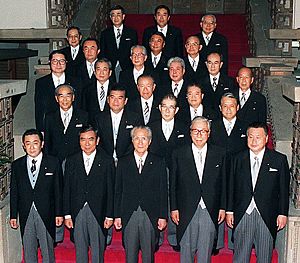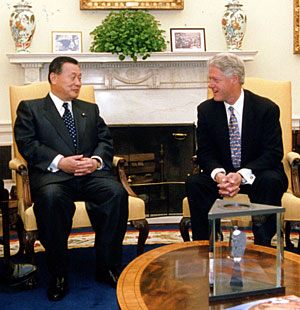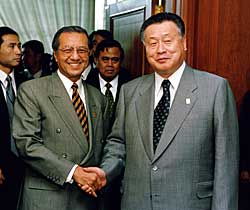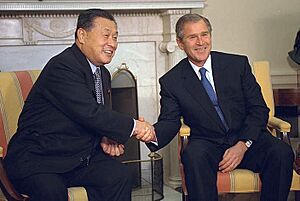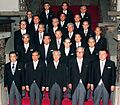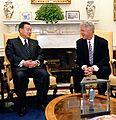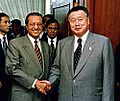Yoshirō Mori facts for kids
Quick facts for kids
Yoshiro Mori
|
|
|---|---|
|
森 喜朗
|
|
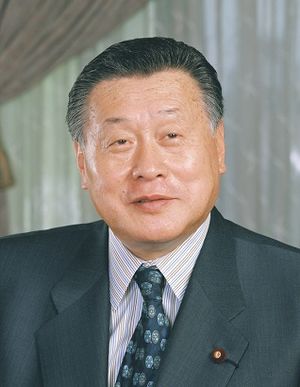
Official portrait, 2000
|
|
| Prime Minister of Japan | |
| In office 5 April 2000 – 26 April 2001 |
|
| Monarch | Akihito |
| Preceded by | Keizō Obuchi |
| Succeeded by | Junichiro Koizumi |
| President of the Liberal Democratic Party | |
| In office 5 April 2000 – 24 April 2001 |
|
| Secretary-General |
|
| Preceded by | Keizō Obuchi |
| Succeeded by | Junichiro Koizumi |
| Minister of Construction | |
| In office 8 August 1995 – 11 January 1996 |
|
| Prime Minister | Tomiichi Murayama |
| Preceded by | Koken Nosaka |
| Succeeded by | Eiichi Nakao |
| Minister of International Trade and Industry | |
| In office 12 December 1992 – 20 July 1993 |
|
| Prime Minister | Kiichi Miyazawa |
| Preceded by | Kozo Watanabe |
| Succeeded by | Hiroshi Kumagai |
| Minister of Education | |
| In office 27 December 1983 – 1 November 1984 |
|
| Prime Minister | Yasuhiro Nakasone |
| Preceded by | Mitsuo Setoyama |
| Succeeded by | Hikaru Matsunaga |
| President of the Tokyo Organising Committee of the Olympic and Paralympic Games | |
| In office 24 January 2014 – 18 February 2021 |
|
| IOC President | Thomas Bach |
| Preceded by | Committee established |
| Succeeded by | Seiko Hashimoto |
| Member of the House of Representatives from Ishikawa |
|
| In office 28 December 1969 – 20 October 1996 |
|
| Preceded by | Eiichi Sakata |
| Succeeded by | Constituency abolished |
| Constituency | 1st district (Multi-member) |
| In office 20 October 1996 – 16 November 2012 |
|
| Preceded by | Constituency established |
| Succeeded by | Hajime Sasaki |
| Constituency | 2nd district |
| Personal details | |
| Born | 14 July 1937 Nomi, Ishikawa, Empire of Japan |
| Political party | Liberal Democratic (Seiwakai) |
| Spouse | Chieko Maki |
| Children | Yūki Mori Yoko Fujimoto |
| Alma mater | Waseda University (BBA) |
| Website | Yoshiro Mori WebSite |
Yoshirō Mori (森 喜朗, Mori Yoshirō, born 14 July 1937) is a Japanese politician. He served as the Prime Minister of Japan and leader of the Liberal Democratic Party from 2000 to 2001. During his time as prime minister, he was not very popular with the public. He is also known for some comments he made that caused debate.
Mori was born in what is now Nomi, Ishikawa, Japan. Before he became a politician, he worked as a journalist. In 1969, he was elected to the lower house of Japan's parliament. He represented the Ishikawa 2nd district. Over the years, he held several important government jobs. He was the education minister from 1983 to 1984. Later, he became the minister for international trade and industry from 1992 to 1993. He also served as the construction minister from 1995 to 1996. After that, he became a top leader in the Liberal Democratic Party (LDP).
In April 2000, the prime minister at the time, Keizō Obuchi, became very ill. Yoshiro Mori was then chosen to become the new leader of the LDP and the new prime minister. This happened just a few days before Obuchi passed away. During his time as prime minister, news reports often focused on his public comments. These comments sometimes caused controversy and made him less popular. Some members of his team also resigned because of issues with fundraising. Mori's approval ratings dropped very low. In April 2001, he announced that he would step down. Junichiro Koizumi then became the new prime minister.
After leaving the prime minister's office, Mori continued to be a member of the House of Representatives. He retired from parliament in 2012. He remained important in the relationship between Japan and Russia. This was because he had a good personal connection with Vladimir Putin, the Russian president. Mori also served as the President of the Japan Rugby Football Union. In 2014, he was chosen to lead the committee organizing the 2020 Summer Olympics and Paralympics in Tokyo. He resigned from this role in 2021 after making comments that were seen as unfair to women. In 2003, he received a high award from the Scout Association of Japan.
Contents
Early Life and Education
Yoshiro Mori was born in Nomi, Ishikawa, Japan. His parents, Shigeki and Kaoru Mori, were wealthy rice farmers. His family had a history in politics. Both his father and grandfather had served as the mayor of Neagari. Mori's mother passed away when he was seven years old.
He went to Waseda University in Tokyo. While there, he joined the rugby union club. He really loved the sport, even though he wasn't a top player. He once used rugby to explain how he worked with other political groups. He said, "In rugby, one person doesn't become a star. One person plays for all, and all play for one." After university, Mori worked for a newspaper called Sankei Shimbun.
Political Career
In 1962, Mori left his newspaper job. He became a secretary for a member of the Japanese parliament. In the 1969 election, he was elected to the lower house at 32 years old. He was reelected ten times in a row.
Mori held several important government positions. He was the education minister from 1983 to 1984. He also served as the minister for international trade and industry from 1992 to 1993. From 1995 to 1996, he was the construction minister. In 1999, Mori started to take on a leadership role within a group of politicians in the Liberal Democratic Party (LDP).
Prime Minister
In April 2000, the prime minister, Keizō Obuchi, became very ill. He could no longer continue in his role. The government held an emergency meeting, and everyone in the cabinet resigned. Mori, who was a top leader in the Liberal Democratic Party (LDP), was chosen to be the new president of the party. He then became prime minister. He had the support of the LDP and other parties. Mori announced that he would keep the same cabinet members that Obuchi had.
Public Comments and Challenges
During his time as prime minister, news reports often focused on comments Mori made. These comments sometimes caused public discussion.
- In May 2000, Mori described Japan as a "divine nation" with the Emperor at its center. This statement caused some debate in Japan.
- In June 2000, during an election, he was asked about voters who hadn't decided who to vote for. He joked that they could "stay in bed for the day."
- In February 2001, a U.S. submarine accidentally hit and sank a Japanese fishing ship. Nine students and teachers died. Mori continued playing golf after hearing about the accident. Many people criticized him for this.
Resignation
Two of Mori's senior team members resigned in August 2000 due to issues with fundraising. After this, Mori's public disapproval rating grew.
In November 2000, Mori's approval ratings were very low. Other politicians tried to pass a "no confidence" vote against him. This means they wanted to remove him from office. However, leaders in his own party stopped this effort. They warned that any party members who voted against Mori would be removed from the party. The vote failed.
Towards the end of Mori's term, his approval rating dropped even lower. In March 2001, there were reports that Mori planned to resign. He denied this at first. However, on April 6, he officially announced his intention to step down. Junichiro Koizumi then won the election to become the new leader of the LDP. Koizumi became prime minister on April 26, 2001.
Later Years
After he resigned as prime minister, Mori remained a member of the House of Representatives. He represented the Ishikawa 2nd district. In July 2012, he announced that he would not run in the December 2012 election.
In 2004, he received the Padma Bhushan, a high civilian award from India.
Russia Diplomacy
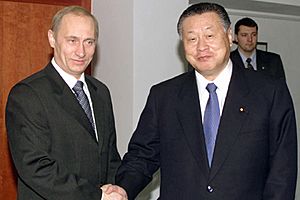
Mori continued to be important in the relationship between Japan and Russia. This was because he had a close personal connection with Vladimir Putin. In 2013, Mori met with Putin to prepare for a meeting between Putin and Japan's Prime Minister Shinzō Abe.
Mori has a personal connection to Russia through his father, Shigeki Mori. His father had a special relationship with the Siberian town of Shelekhov. He worked to improve the graves of Soviet soldiers in Japan and Japanese soldiers in Siberia. Mori's father visited Shelekhov many times. He was even buried there after he passed away.
Sports Leadership
Mori became the President of the Japan Rugby Football Union in June 2005. He hoped his influence would help Japan host the 2011 Rugby Union World Cup. However, the event was given to New Zealand. Mori later helped Japan successfully bid for the 2019 Rugby World Cup and the 2020 Summer Olympics.
In 2014, at 76 years old, he was chosen to lead the committee organizing the 2020 Summer Olympics in Tokyo. He joked that this would be his "one last service to the country." However, Mori faced criticism for comments he made about Japan's Olympic figure skaters.
Another issue happened in 2021. Mori, who was then leading the Olympic organizing committee, made comments about women talking too much in meetings. He said that meetings with many women take a long time because everyone wants to speak. He later apologized for his statements. He initially said he would not resign. However, on February 11, he announced his plan to step down. In his resignation speech, Mori said he did not mean to disrespect women. He also said the media made the public angry. He emphasized that the Olympics should happen in July. He felt his efforts would be wasted if he caused problems by staying in his role. Seiko Hashimoto, an Olympic medalist, was named as his replacement.
Personal Life
Mori is a big fan of rugby and also plays it as a hobby. He is married to Chieko Maki, who also went to Waseda University. They have a son, Yūki Mori, and a daughter, Yoko Fujimoto.
In 2003, he received the Golden Pheasant Award. This is the highest honor from the Scout Association of Japan.
Honours
- National
- Foreign

 Padma Bhushan (2004)
Padma Bhushan (2004)
 Order of Brilliant Star with Special Grand Cordon (2006)
Order of Brilliant Star with Special Grand Cordon (2006)
 Medal "In Commemoration of the 300th Anniversary of Saint Petersburg" (2007)
Medal "In Commemoration of the 300th Anniversary of Saint Petersburg" (2007)
 Grand Officier, Légion d'honneur (2010)
Grand Officier, Légion d'honneur (2010)
 Order of Diplomatic Service Merit Grand Gwanghwa Medal (2010)
Order of Diplomatic Service Merit Grand Gwanghwa Medal (2010)
Images for kids
See also
 In Spanish: Yoshirō Mori para niños
In Spanish: Yoshirō Mori para niños
 | Aurelia Browder |
 | Nannie Helen Burroughs |
 | Michelle Alexander |


